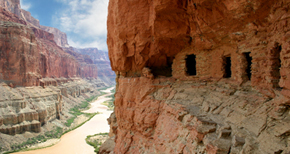Professional archaeologists can work in many different settings. Archaeologists find employment in Federal, State, and Tribal government agencies, museums and historic sites, colleges and universities, cultural resource management firms, and engineering firms with cultural resource management divisions. Some archaeologists work as independent consultants or form their own companies.
Where Archaeologists Work
The majority of archaeologists today work in cultural resource management, or CRM. CRM companies are responsible for the archaeological research done to follow federal historic preservation laws. Archaeologists employed in CRM firms may work as temporary field or laboratory assistants. Or they may be project managers or administrators. CRM archaeologists direct field and lab work and manage staff. After collecting data, they are responsible for writing reports and other publications to share the results of their research. CRM archaeologists may also engage in public education and outreach efforts. They could share their discoveries with the public through site tours, brochures, and exhibits.
Archaeologists do much more than "dig." Archaeologists in federal, tribal, and state government agencies are responsible for managing, protecting, and interpreting archaeological sites on public land. Some work in museums, archaeological parks, or historic sites. Archaeologists may manage collections of artifacts, work in education or public programming. They may become administrators that manage programs relating to research, collections, education, and exhibitions. Colleges and universities hire archaeologists as faculty to teach undergraduate and graduate students. In addition to teaching, academic archaeologists are active researchers in their field. They write grants to help fund their research. They also oversee the analysis and interpretation of projects and publish the results of their work. Their research appears in books, journals, and popular publications.
Do Archaeologists Travel?
It depends. Archaeologists whose research areas are not near where they live may travel to conduct surveys, excavations, and laboratory analyses. Many archaeologists, however, do not travel that much. This is true for some jobs in federal and state government, museums, parks and historic sites. Those jobs involve managing collections, public programs, education initiatives. Other archaeologists travel, but within a confined geographic area. For example, an archaeologist who manages projects for a large engineering firm may travel within a several hundred mile radius as needed by the company. Their travel may depend on the projects that are active at the moment. They may spend much of their time in the lab and office doing analysis and writing reports or publications. Professional archaeologists spend more of their time on these tasks than they do in the field.
Archaeological Education
Secondary School
In high school, it is important to develop your basic skills in math, science, English, and history. Archaeologists need excellent research and writing skills—they write more than they dig! They also apply mathematical and statistical concepts in the field and data analysis. Studying foreign languages can also be helpful, as could gaining skills in programming, chemistry, or physics. Archaeologists also need to be good at communicating with a range of audiences. They share their results with fellow archaeologists and the general public.
Post-Secondary School
The minimum amount of education needed to work in the field of archaeology is a 4-year college degree (BA or BS). Usually archaeologists major in anthropology or archaeology. They also receive training in archaeological field and laboratory techniques. Positions available with this level of education and training are restricted to field or laboratory assistants. Some professional qualifications for an archaeologist are defined by the Register of Professional Archaeologists. RPA requires post-graduate study (a Masters or Doctorate) in anthropology, as well as work experience supervising archaeology field and lab projects.
In North America, students interested in archaeology usually major in anthropology, which has four subfields—cultural anthropology, biological anthropology, linguistic anthropology, and archaeology. Students majoring in anthropology generally take courses in all four subfields. When researching colleges and universities, look for a school that has a department of anthropology with at least one archaeologist on the faculty. Also, participating in a university-sponsored field school is required to gain employment as an archaeologist. A field school is generally a credit-based course where students learn and take part in active archaeological field- and lab-based research. When planning your degree, look at what opportunities for field and lab work are available. Some schools have an archaeology lab or a museum that may offer training, volunteer, or paid work opportunities to students.


